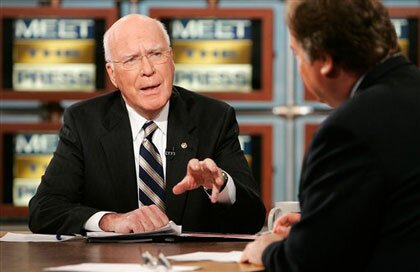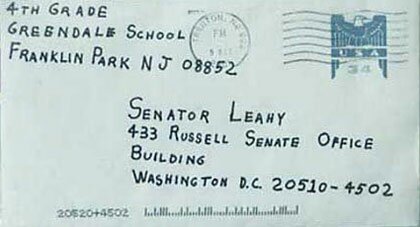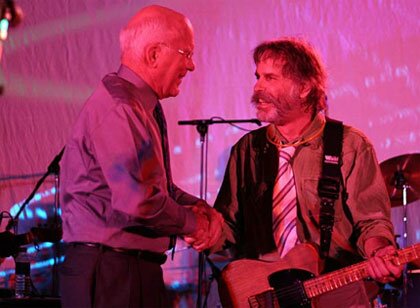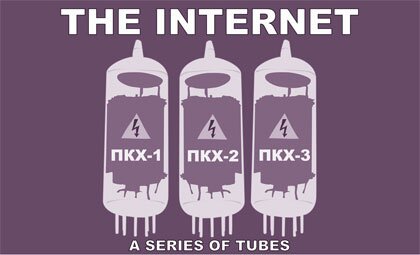TALES FROM THE RUSTY SCUFFER:
A Little Light Lunch with Senator Patrick Leahy
Political legends, like all species of legend, evolve in fits and starts, over time. And evolution is, by definition, almost impossible to spot in process: it occurs on a time-line far longer than any one observer can match.

Still, over the last year it has been impossible to watch Senator Patrick Leahy without the distinct sense that one is watching the final, crucial molding of a highly improbable American political legend.
And the twin brackets of that Leahy legend are the uniquely secretive and partisan administrations of Richard M. Nixon and George W. Bush.
Sent to the Senate as an improbably young man of 34, Leahy was on the leading wave of post-Watergate reformers, a freshman class that included Gary Hart and John Glenn (and very nearly Bill Clinton). And when a disillusioned American electorate brought Democrats back into the majority in 2006, it was once again Leahy’s particular task to translate that reformist impulse into action.
As Chair of the Senate Judiciary Committee, he was suddenly personally responsible for providing the oversight of the War and the White House that Republicans had not simply shirked but actively thwarted; he was responsible for rooting out the partisan kudzu overwhelming the Department of Justice; responsible for stopping the ideological stacking of the Courts.
Those great pressures, of course, are the only sort strong enough to shape legend. The US Attorney Scandal, perhaps more than any other, has demonstrated Leahy’s tough but cautious approach: as of today, nine major figures have been forced to resign from the Department of Justice, including the preternaturally forgetful Alberto Gonzales just this past week.
Yet in that same scandal, crucial Judiciary Committee subpoenas remain unanswered — and sweeping claims of White House privilege remain in effect.
And here is where the final movements of the Leahy story remain unwritten: if the strained notion of the Unitary Executive is ever to die a well-deserved death, it’s odds on that Patrick Joseph Leahy will be the man who ultimately slays it.
Should it remain unslain, though, for any reason, he will bear a disproportionate share of the ensuing disappointment on the Left.
Which is to say that not just Vermont or America but the world is awaiting the outcome of the clash between the Executive and Judicial branches in the coming sixteen months.
That’s pressure of a sort you and I will never know.
So it seemed the perfect moment to sit down with Leahy for a little light lunch — and as luck would have it, the sit-down fell just two days after the Gonzales resignation.
Leahy had picked the Rusty Scuffer on Burlington’s Church Street as a venue, and it was fitting somehow: a pleasantly dark, unabashedly old-school seafood joint that probably hasn’t changed much at all since that election night in 1974 when all the state’s political reporters flocked as one to Montpelier, there to cover the election of Vermont’s brash new young Senator, 50-year-old Richard Mallary.

******
VDB: Very quickly, right up front here, so I don’t forget: the headline in the Washington Post is that Bush wants another $50 billion to fund Iraq and Afghanistan —
Rusty Scuffer Waitress: (To Leahy) Do you want more coffee?
Leahy: (Smiling) I shouldn’t, but I will.
VDB: — and the Post sees this as proof that the Administration is confident it has already won the September political battle continuing the Surge. Do you think that’s so, is that battle already lost, and will you vote for the appropriation, even without language concerning deployment?
Leahy: If there’s no language limiting deployment, then I don’t know how I could vote for it. I voted against the last one because there was no such language. I think what we should do, if we really feel strongly about this — and we’re gonna need more than a few Republicans to be able to do this, we’re not going to be able to do it with Democrats alone — is to put some real criteria in the bill.
These blank checks are a terrible mistake. Especially when we’re told we have to cut out the COPS [Community Policing] program here at home in the United States, because we don’t have the money — it has to go to the Iraqi police, so they can kill each other. We don’t have the money for school loans — we’re going to put it into an educational system over there where they’re shooting the teachers.
My whole point is that we’re told we don’t have the money for child healthcare, we don’t have the money for cancer research, because we need it for Iraq. And what do we get? We get open-ended appropriations to companies like Haliburton and others, and they do very, very well. We’re basically told, Trust us.
And this from the people who handled Katrina.
This is an administration that inherited the largest surplus in the nation’s history, turned it into the largest deficit, tripled the national debt. The dollar has collapsed — well not exactly collapsed, but sunk precipitously worldwide, and we can’t speak up on human rights issues with China because they hold too much of our debt.
VDB: And because we operate Guantanamo. But I was going to ask if you’d had a chance to speak at all with Senator Warner about what he might accept [in the way of withdrawal language]?
Leahy: I haven’t; I’m going back to Washington tomorrow. John [Warner] is a very, very close friend. It’s my joke that I call him my Senator away from home, when I’m down there. I will talk to him. John and I usually just sit down quietly, the two of us, have lunch, and talk. In the morning, we always park right next to each other. So I’m going to talk with him.

VDB: Yeah, when he said he planned to look over Democratic bills carefully and decide then, that seemed like a pretty broad signal to the White House.
Leahy: A major move on John’s part. He has a lot of respect for Carl Levin. Carl’s worked very hard on this. And I have a lot of respect for Carl Levin.
VDB: Sure. Well, I want to get back to those issues, and the current business on the Judiciary Committee, and a replacement for Alberto Gonzales, but first I want to drop back to 1974, your first Senate race [Leahy’s eyebrows shoot up in mock-alarm]. I’ve heard your move from State’s Attorney to Senator at age 34 described as Leahy’s Leap, and I have to say I’ve always found that win fascinating: Republicans were the dominant political force by far, you were running against a fairly popular Congressman, you had a three-way race involving Bernie Sanders [for the Liberty Union party], arguably siphoning off votes — I think Bernie ultimately took about 5,900 and your winning margin was only about 4,000 or so — and a week out from the election you were down 13% and the Rutland Herald was already calling the race. And yet —
Leahy: [Hands up, framing the headline in the air] “Poll Dooms Leahy!”
VDB: Right. So you wound up taking almost 50% of the vote, which is amazing. So what I want to ask you about is that last week: was there something that seemed to you to turn events there because it’s hard to imagine what was going on there, even in the wake of Watergate, from this moment now, from 2007.
Leahy: I’ve actually thought about this a lot. That was a very, very difficult week. The Sunday before the election the New York Times had an article pointing out that Vermont was about to elect its youngest Senator since the institution of the popular election for Senators — 50-year-old Richard Mallary, the state’s lone Congressman, who won overwhelmingly two years before.
Even the Democratic Party Chairman, Phil Hoff, was quoted as saying Dick Mallary was gonna win easily. The consensus was that I was a nice guy but that I should have [allows himself slight ironic smile] spent some time in the legislature or been auditor of accounts or something.
The Burlington Free Press wouldn’t even send a reporter to my campaign office election night, because they were all going to Montpelier to be there when they elected the first new Senator in 34 years [Reaches over to snag fries from the plate of advisor Chuck Ross, who mock-swats the hand] Sorry about that. [Eats fries, licks fingers] It was only the college radio stations that came to my campaign headquarters.
VDB: UVM?
Leahy: UVM and Middlebury, where they had a young reporter whose name was Chris Graff.
VDB: And I believe his boss there was a guy named Jim Douglas. He was the news director, I think.
Leahy: So it was very hard. The Free Press, which at that time used to run profiles on the candidates’ spouses, refused to run one on my wife. She’d been up north speaking French with everybody — at that time there was a large population that spoke French at home.
VDB: Now were they covering Bernie but not you? Or were they only covering Mallary?
Leahy: They actually had one of the photographers show a note he had from one of the editors, and it said, “Make sure you don’t have Leahy in the photographs.”
VDB: [Laughter] I’m starting to think maybe there’s a connection here, that no press was the best thing that could have happened to you.
Leahy: Well, the Free Press thought Dick Mallary hadn’t been supportive enough of Nixon, so probably he’s gonna win easily anyway. So we had nobody. Marcelle was helping to drive, and we had three young kids. Our car was falling apart. And I’d start getting discouraged and Marcelle would say, “Patrick, this is not the reaction we’re getting from people.”
Everywhere we’d go, people would come up and say, “You know, you’d be the first Democrat I’ve ever voted for in my life, but you’ve been a good prosecutor, I respect you, you’ve worked hard, I’m gonna vote for you. You might not win, but I’m gonna vote for you.” And we would not give up. We were out campaigning —
VDB: Was Mallary?
Leahy: Yeah, but he, uh —
VDB: Maybe slacked off a bit?
Leahy: Well, he sent out engraved invites for election night. And of course Mallary’s opponent in the Republican primary had stayed neutral, a very good man [significant look over at aide Chuck Ross] named Charles Ross.
Chuck Ross: [Leaning in and whispering] My dad.
VDB: Got it.
Leahy: But George Aiken, arguably the most popular person in Vermont, had endorsed Dick Mallary. Now, also at this time, I finally blocked off some time to go down south and campaign. And I found out about this guy Paul Lawrence, who was a rogue undercover cop who was operating here [setting up false drug arrests], so I cancelled what I was going to do down there, and of course I couldn’t tell anyone why, but I set up a sting operation with Dave Demag — who actually just retired as the Essex police chief, he was a young patrolman then — and he helped out on it and caught Lawrence.
I actually thought it might cost me the election, because this guy Lawrence was very popular. But it was my job, and I had to get him, so I did.
VDB: How closely was your message tuned to Watergate?
Leahy: That was part of it. But I was just against the status quo. I opposed the war in Vietnam, even though polls showed the majority of people supported the war in Vietnam. I’m still, to this day, the only Vermonter who ever voted against the war in Vietnam.
I opposed the death penalty, even though polls showed a majority of Vermonters supported it. In fact they used that against me in the first debate, and I turned around to Dick Mallary, and I said, “How many murderers have you prosecuted? Let me tell you about a murderer I arrested at three o’clock in the morning, personally.” ‘Course I had twenty heavily armed troopers with me, but —
[Brief interlude as manager of Rusty Scuffer approaches the table.]
Rusty Scuffer Manager: Hey Patrick. Good to see you, Buddy. How you doing? Everything okay?
Leahy: Well, it’s good —
Manager: You’re getting a lot of print.
Leahy: Don’t you believe a word of it.
Manager: No, I know it. But it seems like you’re taking all the fun out of government. Lighten up, you guys. Smile a little.
Leahy: Are you smiling?
Manager: For what it’s worth.
Leahy: [Smiling] Are you smiling?
Manager: Smiling? [Moving away, tapping his teeth] I take ‘em out, Patrick. I don’t know what the hell you’re thinking about.
Leahy: Take care, Tom.
Owner: Be good, Pat. My best to Marcelle.
[As Leahy turns from this conversation, Chuck Ross leans over with what appears to be an iPhone, showing Leahy the screen. ]
Chuck Ross: Chuck Schumer’s office is on the phone. They want to know if you can . . .
Leahy: [Thinks a minute] I’ll call him back.
Chuck Ross: [Speaking softly into iPhone] The Senator will call him back . . .
Leahy: Now, there were two tactical things. I think Congressman Mallary expected to win Chittenden County by a wide margin. And to do well in Washington County. Now, I was born in Washington County.
VDB: Montpelier, right?
 Leahy: Montpelier. My father used to stand in front of the Post Office and say to people going out, “Will you vote for my boy?” And people would say, “Well Howard, we’ll vote for your boy but we’re not going to vote for any other Democrats.” And I ended up carrying Chittenden County overwhelmingly, where I’d been State’s Attorney. And I carried Washington County, and that gave the margin.
Leahy: Montpelier. My father used to stand in front of the Post Office and say to people going out, “Will you vote for my boy?” And people would say, “Well Howard, we’ll vote for your boy but we’re not going to vote for any other Democrats.” And I ended up carrying Chittenden County overwhelmingly, where I’d been State’s Attorney. And I carried Washington County, and that gave the margin.
But after the election, the Free Press finally ran a profile of Marcelle, calling her my “Secret Weapon.” In a lot of these French Canadian areas that had always gone heavily Republican before, all of the sudden now they had to split it with a Democrat.
VDB: I just want to connect that up quickly — I found this old Time magazine from 1974, and it profiles you and Gary Hart and John Glenn, all of you just came into office as freshmen. And it leads off with a pull-quote from you: “There is going to be a coalition of people down there in the Senate now doing things a different way. Some of us will have gotten in there tenuously, and we will have to prove ourselves by making some changes. I know I will.”
Do you see parallels between that election, 1974, and 2006, with the war, anti-GOP sentiment because of the war, and with what you’re specifically sent there to do?
Leahy: I think so. I think back then, in part, the mandate was clearer, because it was overwhelming: over 50 seats, in the House and Senate, that changed hands, and 61 Democrats in the Senate. Some of them then didn’t vote like it, but — here’s the difference.
In April of 1975, John Culver, Gary Hart and I were all on the Armed Services Committee, I was the most junior member. It was the Armed Services Committee that was always asked to authorize more money for Vietnam, which it always had done. But that year we voted it down by a one-vote margin.
And that’s how I became the only Vermonter to vote against that war. Now Vietnam would have ended anyway, but as it was that’s where it ended.

VDB: I wanted to ask you about the difference between the expectations then and now, because it seems as though people’s expectations after the midterms of 2006 were so high, and the success that you had initially — in terms of getting a handle on what we now think of as the US Attorney scandal and warrentless wiretapping — all of that raised those expectations really, really high.
And I’m wondering how you manage all of that, people wanting impeachment, and people wanting convictions in a court of law —
Leahy: Well, impeachment is not going to happen. You need a two-thirds vote in the Senate, which is just not gonna happen. We could spend all our time on that, or we can do the things I’ve done, Waxman has done, on oversight — on spending, US Attorneys and all the rest, which is turning out to be fairly successful.
And at the same time we’re passing a lot of legislation — the Children’s Health Act, and things like that. And all of that while dealing with more filibusters than ever in the Senate’s history, for that period of time.
But what is somewhat frustrating is that people will come in and want to stage a sit-in on the war in my office, Bernie [Sanders’s] office, Peter [Welch’s] office, and we’ve been consistently against it. Why don’t they sit in over at —
VDB: Lieberman’s office.
Leahy: [Nodding] Or, in this state, Jim Douglas who supports the war and was a state campaign chair for the President. He’s the guy who has more the ear of the President, so why aren’t you sitting in there? I don’t know if they think it’s easier somehow with us.
But what has happened is that Republicans will vote lock-step against something, and all the Democrats will vote against it, except four or five, and suddenly it’s the Democrats fault.
So as a result, Republicans get off scot-free. Nobody protests them, nobody raises heck about them, whether it’s child care, or health care, or on the war, Gonzales or anything else.
And it makes me think of people supporting Nader in Florida, saying, Well there’s no difference between Gore and Bush — no difference between who they’d nominate to the Supreme Court, no difference on who they’d nominate for Attorney General, but of course there’s enormous differences. I think it’s just easier sometimes to go against your own side.
VDB: On Gonzales, I know you must have been greatly pleased and relieved to have him out of there —
Leahy: And a little bit surprised.
VDB: Really? Did you think he was going to stick it out?
Leahy: Well, there’s been enormous pressure from Republican members of Congress. And the White House, no matter what they say, the White House told him to get out. That’s why you heard the President say the perfunctory things and then hop on the helicopter. And you’ve heard almost nothing since.
VDB: I heard you on NPR the night of the resignation with Robert Segal, and he asked you about Michael Chertoff, and you were silent for a bit, and then Segal nudged you and asked, Can you tell us what you think of that name as a replacement? And you said something to the effect of, “This would be the same person who headed up Katrina?” To which Segal asked, “Can I assume from that response that you would oppose Mr. Chertoff?” And then you said, “It would be an issue we’d have to address,” but you avoided saying what you thought.
Leahy: What I’m hoping, and what I’m saying to the White House is, You’re going to be out of here in 15 months. And you’ve done awful damage to the Department of Justice. And most of the people in the DOJ are non-political, highly professional — if you went in and talked to them for an hour you wouldn’t know if they were Republicans or Democrats. And you’ve done this enormous damage, so put in somebody regular, somebody who could go in almost by acclamation. And clean this thing up.
VDB: That’s why I was amazed to see Ted Olsen’s name floated, because I think of him as — I don’t know if you ever read David Brock’s book Blinded By The Right? [Leahy nods] But Brock calls Olsen the “consigliere to the Clinton-hating Right,” and there’s a series of stories in there about Olsen, but one in particular, where he’s peeping in the windows of David Watkins, one of the figures from the White House Travel Office mini-scandal. Olsen goes with some people in an SUV, and they do this little covert mission to peep in Watkins’s windows.
Is there any serious consideration of him? I know Bush takes him seriously, but in the Congress?
Leahy: I don’t know. I’ve suggested that they sit down beforehand with me and Specter. But if they want to continue to politicize it, then it should become an issue in the next election.
VDB: Okay, I wanted to jump to the anthrax letter, what’s now known as the Leahy Letter. There was the one that was mailed to you, and the one that went out to Tom Daschle —
Leahy: And people died just from touching it.

VDB: Exactly. And in a way, it’s like the hunt for Bin Laden: since there’s no good news, there’s just complete radio silence from the White House. I’m wondering if you’re satisfied with the progress of that investigation —
Leahy: [Face a thundercloud now and voice emphatic and loud enough to turn heads at nearby tables] No! [Then again] No!
VDB: — and do they keep you apprized in any way of the progress of it?
Leahy: [More quietly] I’ve had discussions.
VDB: Yeah.
Leahy: I’m a little sensitive on this one, because two people died touching an envelope I was supposed to open.
VDB: Sure.
Leahy: I feel badly for them, and for their families. And we spent three years, Marcelle and I couldn’t go anywhere without heavily armed people around us. Finally, I said, This guy’s not going to try anything, and our family wants our privacy back. [Meditatively] I wish they had turned this investigation over to some good sheriff or police chief somewhere. I think it’s been very badly handled.
VDB: Yeah, I don’t think there’s any other way to look at it. And when you call it what it is, it was biological warfare conducted against the highest levels of the US government.
Leahy: What I want to know — I have a theory. But what I want to know is why me, why Tom Daschle, why Tom Brokaw?
VDB: Right. That all fits into the profile of a kind of hard-core and obviously insane ideologue on the far Right, somebody who would fixate on especially Tom Daschle, who at that point was the target of daily, vitriolic attacks on Right-wing talk radio.
Leahy: [Slowly, with a little shake of the head] I don’t think it’s somebody insane. I’d accept everything else you said. But I don’t think it’s somebody insane. And I think there are people within our government — certainly from the source of it — who know where it came from. [Taps the table to let that settle in] And these people may not have had anything to do with it, but they certainly know where it came from.
VDB: Just a couple more here. In a recent Dana Milbank column [”The Caped Crusader From Vermont”], he was talking about the upcoming Batman movie, and your love of Batman, and it used that to get into the public’s expectations for the Judiciary Committee that I was referencing before.
So in talking about the extended subpoena deadline, Milbank said, “Holy incrementalism, Batman!” And it seemed to me that what he was playing around with was two possible endings for what might be called the Pat Leahy legend: in one version, it ends with the superhero catching, you know, Karl Rove or whoever, or at least forcing them to testify under oath —
Leahy: [Allowing himself a smile] Or getting Alberto Gonzales to resign.
VDB: Exactly. But it seemed to me that one of your best moments over the last few months was the moment where you and Arlen Specter were publicly considering the White House offer on Rove and Miers testimony, and Specter said why don’t we take the offer and if we don’t like what we get we can always subpoena later. And you said, What the White House has offered [segueing into bad Leahy imitation] is nothing! Nothing! I posted that snippet of video, and people really reacted. And it seemed to me that that really hard line fit in with a kind of, you know, guy on a white horse or superhero idea, and I think people —
Leahy: Don’t read too much into the Batman thing. I started reading when I was four, and I usually remember everything I ever read, comics and everything else. It’s a curse and a blessing. But I caution people. You know how Freud said sometimes a cigar is just a cigar? I don’t fancy myself as any kind of Batman. I would say that one of the most satisfying things I ever did was to work as a prosecutor, because I could stand up for people nobody else would stand up for. And I’ve carried that forward.
I have sitting over my desk a photograph that was actually published in the New York Times, that I took in a refugee camp in El Salvador. It’s a very, very gripping picture, black and white, of an older man in a refugee camp, and he’s staring straight at you. And I have to look him right in the eye every time I sit at my desk. Basically he’s saying to me, Okay, you’ve got this group and that group, and they’ve got money and votes, but what are you doing for me?
Phil, my life would be so much easier if I retired. I don’t make any money being a Senator — I’d make the same amount if I leave. Actually, I’d make a hell of a lot more. And I’d have a lot more time and everything else.
VDB: Definitely. But it seems that for you and Arlen Specter — and I love the way you’ve worked together on the issue — it seems that the defiance of the subpoena itself has become a key symbolic issue —
Leahy: Well, the thing is, How am I gonna get the votes? I’ve got a one-vote margin, and I can’t even count on that every time. We have a couple of Democrats who could go either way.
And what I’ve tried to do with every one of these subpoenas — you know it’d be so easy to hold a press conference and say, “By God, they should be held in contempt and thrown in jail, blah blah blah,” and everybody would say, “Wow, wonderful!”
But it’s like Hotspur and Glendower [from Shakespeare’s Henry IV], he says, “I can call spirits from the vasty deep,” and Hotspur says, “So can I, so can any man. But when you call them, will they come?” And I think of that often. One of my favorite parts of Shakespeare.
And in this case I’ve done it step by step, and we’ve gotten Republican votes on each one of them, and that’s why I have more credibility. Eventually we’ll get all of them.

People said, “Why don’t you have a petition to remove Alberto Gonzales?” And I said, “Why don’t I have hearings and show everybody what he is?” After that hearing, everybody in the Senate knew — especially Republicans — that they had to get rid of him.
I remember when I was a prosecutor. There was a very flamboyant lawyer, and he said during a case, “Gee, I hate to take advantage of a young State’s Attorney like you, you seem like such a low-key, nice guy,” and I said, “well, we’ll see,” and it took fifteen minutes for the jury to come back in guilty on all counts.
On the subpoenas, even to get a contempt citation, you gotta get 60 votes —
VDB: I was thinking also of the contempt citations, and the White House and Justice indicating that they wouldn’t allow those citations to be served.
Leahy: [Grimly] If I can get a contempt citation, I get those sixty votes, I can guarantee you it’s gonna get served. I guarantee that. If I get sixty votes for the citation, and they ignore it, then I guarantee you I can get sixty votes for a Special Prosecutor.
VDB: Okay, so that’s where you would go at that point.
Leahy: Each one of those hearings, even the ones that haven’t gotten coverage, those have all been building blocks. Getting sworn testimony, so later we can say, “You’re contradicting what you said here.” Look at the number of people who have resigned since I began the hearings. Significant number. Look at the law that the Republicans slipped through, the revision of the Patriot Act [in 2006] —
VDB: Which you voted against.
Leahy: Yes, which allowed them to circumvent the Senate [on hiring new US Attorneys]. And so when I brought up legislation to repeal that, the White House said they’d veto such legislation. But it passed overwhelmingly in the Senate, overwhelmingly in the House, and the President very quietly one day signed it into law. So it’s been step by step. [Chuck Ross shows Leahy the face of the iPhone again, and Leahy nods, reaches for his coat.]
VDB: And as you get your coat on, I have to ask just one more: you apparently once introduced Jerry Garcia to Strom Thurmond in the Senate Dining Room. And I gotta know: what was said between the two of them at that meeting? At that major summit?
Leahy: [Putting the coat immediately back down] My mother, God rest her soul, used to say, “Patrick, people think you’re not serious when you do these things, like Batman and the Grateful Dead.” I also once made the comment that if I could do anything I wanted to do in life, if I had to work for a living, I’d be a photographer.

But Marcelle and I used to sit up by the sound guy, on stage, for some of the Dead concerts, and we’d leave just before the last song. So the last time they played Washington I said, “Hey, why don’t you guys stay tonight. I’ll give you a tour of the Capital, and take you to lunch in the Senators’ Dining Room.”
And Jerry, who was usually very shy, says, “Great idea!” I said, “You gotta wear a tie — you can wear one of yours [the Garcia Collection],” but he says, “I don’t wanna wear one of those.” [Laughing]
Now the cops at the Capital all wanna get Jerry Garcia’s autograph, turns out. So we’re sitting at a big round table, and Woody Harrelson was with us at the time, and Strom Thurmond comes in and suddenly someone points out to him who Jerry Garcia is, and Thurmond comes over and says [imitating Thurmond’s inch-thick Southern accent], “I say, boy!” and yanks Garcia to his feet.
He whacks Garcia on the shoulder, and Strom says, “I see you’re here with my good friend Senator uh . . . from uh . . . well anyway, I’m Strom Thurmond, and I’m the oldest member of the United States Senate, you hear me, boy?” I’d worked with him for twenty-five years, and he couldn’t remember me. But then he whacks Garcia again. Poor Jerry’s rocking back and forth.
VDB: [Cracking up]
Leahy: Strom says, “Now when you go back to Texas — ” and Jerry interrupts and says, “California, Sir” — but Thurmond yells, “Wherever!” and he whams Jerry on the back again.
“When you git home, you tell ‘em you met the oldest member of the United States Senate, you hear me, boy!” Wham again. “Because they’ll want to know that, see? Oldest member of the US Senate, see? You git me, boy?” Wham again!
So finally he drops Jerry’s arm, and Garcia sort of sinks down in his seat. And Mickey Hart leans over and says, “Jerry! Do you know who that was?”
And Jerry says, “Oh yeah, I do.” And then Jerry thinks about it, and he says, “You know, I never had an experience anywhere like that, even when I used to drop acid.”
[Thanks to Colleen McLaughlin, for the photo of Leahy speaking with her son, Louis Santillo, a member of the Vermont Army National Guard.]






 Leahy: Montpelier. My father used to stand in front of the Post Office and say to people going out, “Will you vote for my boy?” And people would say, “Well Howard, we’ll vote for your boy but we’re not going to vote for any other Democrats.” And I ended up carrying Chittenden County overwhelmingly, where I’d been State’s Attorney. And I carried Washington County, and that gave the margin.
Leahy: Montpelier. My father used to stand in front of the Post Office and say to people going out, “Will you vote for my boy?” And people would say, “Well Howard, we’ll vote for your boy but we’re not going to vote for any other Democrats.” And I ended up carrying Chittenden County overwhelmingly, where I’d been State’s Attorney. And I carried Washington County, and that gave the margin.


